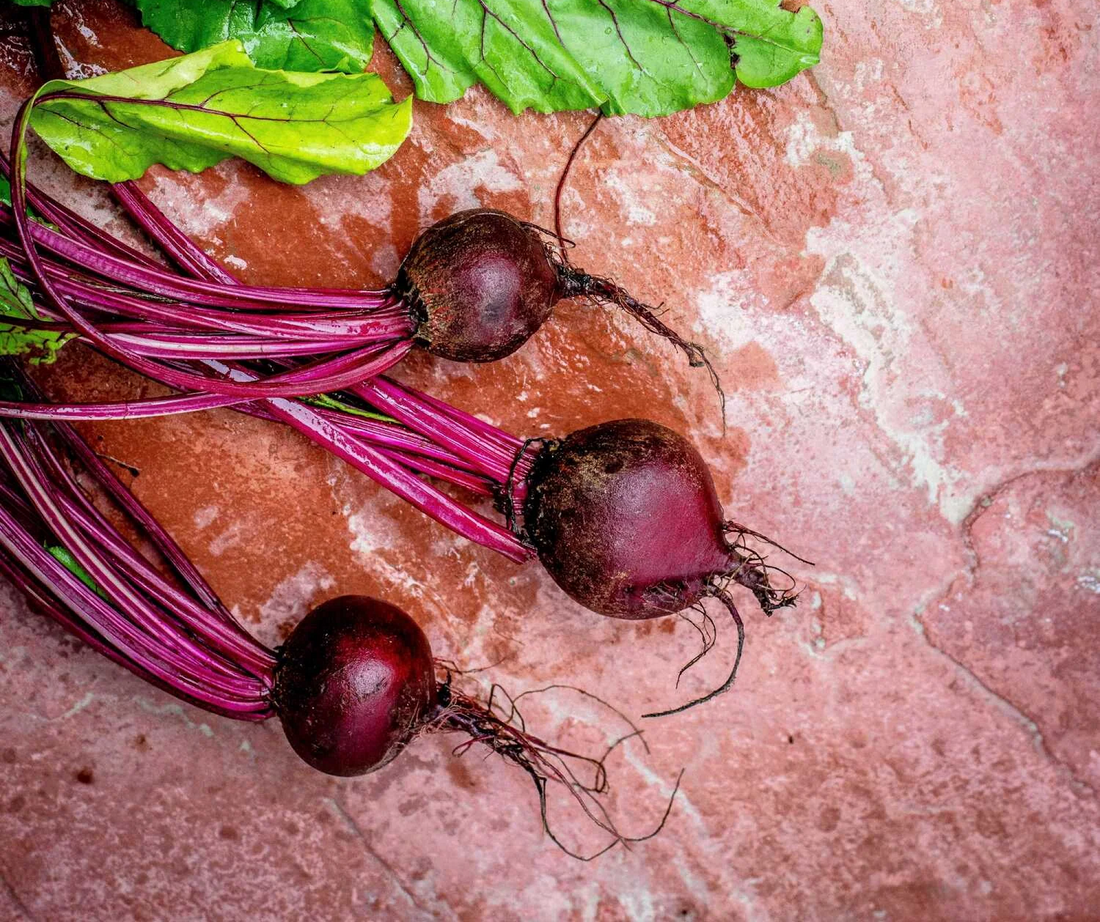

One of my favorite beverages for gut health is beet kvass. I drink a 4 ounce shot several times per week! Beet kvass is a fermented beverage that can support the microbiome and digestive system due to its probiotic content. Beets are loaded with nutrients, and this drink can help alkalize blood, cleanse the liver, and promote bowel regularity. Beet kvass can also be used in place of vinegar in salad dressings and as an addition to soups!
Here’s an easy beet kvass recipe I use from Sally Fallon’s book, Nourishing Traditions.
Beet Kvass Recipe for Gut Health
Ingredients:
- 3 medium-sized organic beets, peeled and cut up coarsely
- 1/4 cup whey
- 4 cups of filtered water
- 1 tablespoon sea salt
- Filtered water
Instructions:
- Place beets, whey and salt in a 2-quart glass container.
- Add filtered water to fill the container.
- Stir well and cover securely.
- Keep at room temperature another 2 days.
- The resulting brew will be slightly less strong than the first.
- After the second brew, discard the beets and start again.
- You may, however, reserve some of the liquid and use this as your inoculant instead of the whey.
Note: Do not use grated beets in the preparation of beet tonic. When grated, beets exude too much juice resulting in a too rapid fermentation that favors the production of alcohol rather than lactic acid.
What does it taste like?
Beet kvass has a unique flavor profile. It’s earthy, slightly salty, and mildly tangy due to the fermentation process. The addition of ginger or garlic can add subtle spicy or savory notes, enhancing the overall taste.
Can you eat the beets after making kvass?
Yes, you can eat the beets after making kvass. While most of the nutrients from the beets will have leached into the kvass during fermentation, the beets will still retain some flavor and can be used in salads, soups, or even blended into smoothies.
Is beet kvass good for your liver?
Beet kvass is believed to have potential benefits for liver health. Beets are rich in antioxidants and betaine, which can support liver function and detoxification processes. Additionally, the probiotics produced during fermentation can help promote a healthy gut, which in turn may have positive effects on liver health.
If you are interested in even more details here’s a more detailed discussion on the Ferment for Function blog with lots more information!
Interested in learning more recipes to support your microbiome health? Check out our YouTube channel where I share my favorites!
With gratitude,

 Martha Carlin, is a “Citizen Scientist”,
systems thinker, wife of Parkinson’s warrior, John Carlin, and founder of The BioCollective , a microbiome company expanding
the reach of science and BiotiQuest, the first of it’s kind probiotic line. Since John’s diagnosis in 2002,
Martha began learning the science of agriculture, nutrition, environment, infectious disease, Parkinson’s
pathology and much more. In 2014, when the first research was published showing a connection between the gut
bacteria and the two phenotypes of Parkinson’s, Martha quit her former career as a business turnaround expert
and founded The BioCollective to accelerate the discovery of the impact of gut health on all human disease. Martha was a speaker at the White House 2016 Microbiome Initiative launch, challenging the scientific
community to “think in a broader context”. Her systems thinking background and experience has led to collaborations
across the scientific spectrum from neuroscience to engineering to infectious disease. She is a respected out of the
box problem solver in the microbiome field and brings a unique perspective to helping others understand the
connections from the soil to the food to our guts and our brains.
Martha Carlin, is a “Citizen Scientist”,
systems thinker, wife of Parkinson’s warrior, John Carlin, and founder of The BioCollective , a microbiome company expanding
the reach of science and BiotiQuest, the first of it’s kind probiotic line. Since John’s diagnosis in 2002,
Martha began learning the science of agriculture, nutrition, environment, infectious disease, Parkinson’s
pathology and much more. In 2014, when the first research was published showing a connection between the gut
bacteria and the two phenotypes of Parkinson’s, Martha quit her former career as a business turnaround expert
and founded The BioCollective to accelerate the discovery of the impact of gut health on all human disease. Martha was a speaker at the White House 2016 Microbiome Initiative launch, challenging the scientific
community to “think in a broader context”. Her systems thinking background and experience has led to collaborations
across the scientific spectrum from neuroscience to engineering to infectious disease. She is a respected out of the
box problem solver in the microbiome field and brings a unique perspective to helping others understand the
connections from the soil to the food to our guts and our brains.


Waking Up to a Probiotic Breakfast Can Do Wonders for Your Gut Health
Did you know that recent studies show people with poor gut diversity had lower quality of life? The health of your microbiome impacts your mental health, sleep, energy, the risk for chronic illnesses, and much more. A probiotic breakfast can...

Can Probiotic Supplements Make or Break Your Fast?
Intermittent fasting (IF) may have started as a fitness trend for weight loss, but today it's a go-to lifestyle choice for many. Practicing intermittent fasting has been linked with health benefits such as lowering blood sugar and insulin, preventing heart...














 Martha Carlin
Martha Carlin







